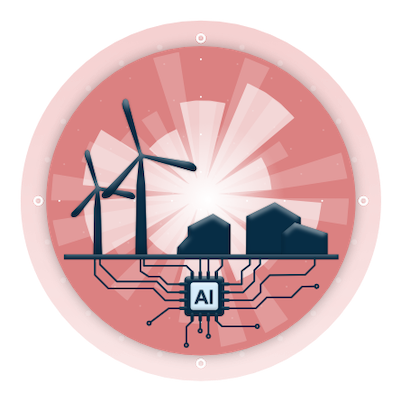FIELD: POWER AND ELECTRICAL ENGINEERING
ENERGY FOR SMART CITIES
Ural Power Engineering Institute offers a new master's curriculum Energy for Smart Cities. Graduates of the program will gain unique competencies in design, operation, control and analysis of modern urban power systems with particular focus on machine learning technologies. The target audience of the program are bachelors and specialists in technical sciences.
Fully taught in English
2 study years 120 ECTS
Full time mode of study
15 vacant places

YOU CAN CONTROL ENERGY
About the program
Future professional activities
The future professional activities of the graduates are connected with: - designing and implementation of smart solutions for urban energy systems - project management in power systems and power grids - operation and monitoring of the power equipment and automated control systems
Core of the program
The program covers the design of modern energy systems, construction and operation of power equipment and ways to implement modern information technologies in the energy sector. The program is composed of the following core parts: - modules, covering the issues of creation and operation of urban intelligent power grids - classical modules, dedicated to the special issues of design and development of high-voltage power equipment and power systems - modules, addressing modern information technologies and their industry application The masters curriculum takes it's roots from the Erasmus+ ESSENCE project funded by the Erasmus+ Programme of the European Union, Key Action 2, Capacity Building in Higher Education.
Industrial partner
Tavrida Electric is the Russian company, which actively implements the results of scientific research in the power industry. The main fields of the company are design, development, engineering, and support of the intellectual hardware and software solutions for the process of optimal distribution of electrical energy. Tavrida's products and solutions are designed for the power grids of energy distribution companies, oil and gas companies and other industrial and infrastructure companies. The modules Modeling and programming in power industry and Project-based practical training are made on the basis of the Digital power distribution zone project of Tavrida Electric. This is a project to create an integrated domestic management system on an open data platform.
Disciplines
The disciplines of the program address the basic principles of construction and design of modern urban energy systems together with the industry-oriented application of the information technologies aimed at assuring reliable operation and control of the high-voltage electrical equipment and the power system.
The discipline studies the main machine learning techniques and their application in the power industry. The following sections and machine learning techniques are considered: supervised learning in classification and regression problems (linear models, support vector machines, decision trees, Bayesian methods, k-nearest neighbors, neural networks, ensemble algorithms), unsupervised learning (clustering algorithms), reinforcement learning and optimization methods (genetic and swarm algorithms), fuzzy logic. Special focus is given to preliminary analysis and data processing approaches.
The discipline studies the basic principles of assuring data security and providing protection against cyber threats for power system facilities. The discipline covers legal and organizational issues, software specifics, technical and algorithmic methods of data protection used to assess the threats and to model the corresponding protection measures. Special consideration is given to the existing legal framework in the sphere of data protection and the relevant industrial standards. The discipline forms deep understanding of the types of data to be protected, the classification of cyber threats at power system facilities, various protection techniques, the principles of their operation and selection criteria. The project is implemented by the winner of the Master's Program Faculty Grant Competition of the Vladimir Potanin Fellowship Program.
The discipline studies the principles of designing urban power grids and provides the detailed consideration of different types of energy consumers, their technological operation modes, power quality requirements. Special consideraion is given to the energy saving technologies and renewable energy sources application in modern power systems.
The discipline highlights the design and operation issues of small-scaled power generation facilities (distributed generation), including hydrocarbon and renewable energy-based ones. Technical and economic issues related to distributed generation are investigated, including distributed generation operation modes, grid connection and parallel operation with bulk power system.
The discipline covers the fundamentals of the technical diagnosis theory with particular focus on high-voltage power equipment. The primary barriers associated with technical diagnosis effective implementation are highlighted with detailed consideration of the existing technologies and tools as well as the relevant methodologies for creating diagnosis and monitoring systems. As part of the discipline, much attention is paid to the basics of designing diagnosis systems, applying nondestructive testing methods and selecting diagnostic parameters for the object of study. As a result of mastering the discipline the students will gain deep understading of the relation between the physical aspects of power equipment operation, aging, external factors and diagnostic parameters.
The discipline is devoted to the application of optimization techniques to solve the critical problems of the power industry. Due to the task-orented nature of the discipline, special focus is given to the optimization methods application, skill-building in setting and solving the optimization problems. Much attention is paid to the information support of the power system control tasks. The application of Matlab, MathCAD and PowerFactory to practical cases of power system optimization and load forecasting is carefully studied. Within the discipline, the principles and methods of taking into account various constraints and external impacts are studied.
Meet our teachers
The teachers of the programs are the leading experts in the sphere of power and electrical engineering, thermal engineering, mathematics, informatics, cybernetics, economy, history and legal regulation.
Head of the Scientific laboratory of digital twins in the power industry Ural Power Engineering Institute, PhD
Head of program
Associate professor of the Electrical engineering department Ural Power Engineering Institute, PhD
Leading researcher of the of the of the Scientific laboratory of digital twins in the power industry Ural Power Engineering Institute, PhD
Professor of the Russian history department UrFU, DSc